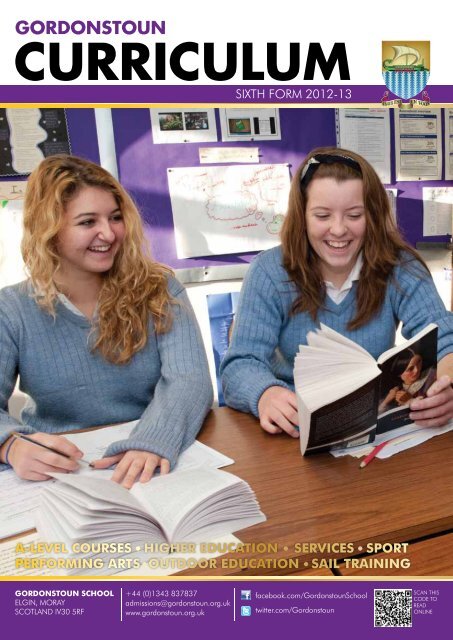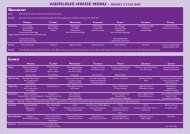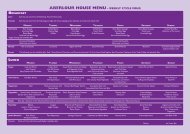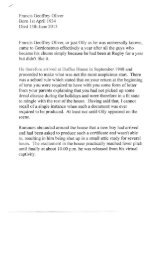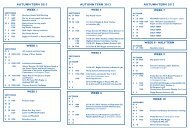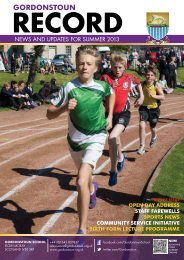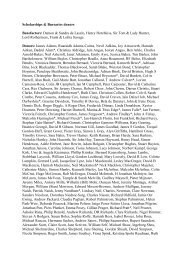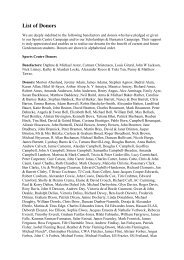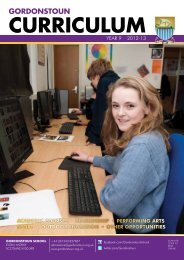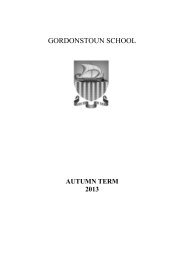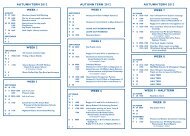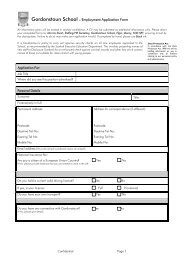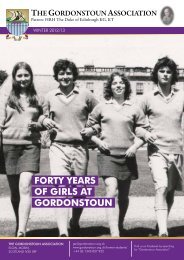Sixth Form Curriculum here - Gordonstoun
Sixth Form Curriculum here - Gordonstoun
Sixth Form Curriculum here - Gordonstoun
You also want an ePaper? Increase the reach of your titles
YUMPU automatically turns print PDFs into web optimized ePapers that Google loves.
gordonstoun<br />
curriculum<br />
sixth form 2012-13<br />
A-LEVEL COURSES HIGHER EDUCATION SERVICES SPORT<br />
PERFORMING ARTS OUTDOOR EDUCATION SAIL TRAINING<br />
gordonstoun school<br />
ELGIN, MORAY<br />
SCOTLAND IV30 5RF<br />
+44 (0)1343 837837<br />
admissions@gordonstoun.org.uk<br />
www.gordonstoun.org.uk<br />
facebook.com/<strong>Gordonstoun</strong>School<br />
twitter.com/<strong>Gordonstoun</strong><br />
SCAN THIS<br />
CODE TO<br />
READ<br />
ONLINE
Contents<br />
SIXTH FORM CURRICULUM 2012-13<br />
Welcome 2<br />
Academic Subjects: Introduction 3<br />
A-Level Courses 4<br />
AS-Level Courses 16<br />
Other Subjects 18<br />
Eal & learning support 19<br />
Higher Education 20<br />
Library 22<br />
Services 23<br />
sport & ACTIVITIES 28<br />
Performing ARTS 29<br />
Outdoor EDUCATION 31<br />
Sail Training & Seamanship 32<br />
International and Spiritual Citizenship 33<br />
& Duke of Edinburgh’s award<br />
Student Development Scheme 34<br />
Other OPPORTUNITIES 35<br />
life in the sixth FORM 36<br />
P
Welcome<br />
SIXTH FORM AT GORDONSTOUN<br />
Life in the <strong>Sixth</strong> <strong>Form</strong> at <strong>Gordonstoun</strong> aims to bring out the most<br />
in its students, in line with our motto: Plus est en vous - T<strong>here</strong> is<br />
more in you. As pupils move into the <strong>Sixth</strong> <strong>Form</strong> at <strong>Gordonstoun</strong>,<br />
they are joined by a large intake of new students from all corners<br />
of the globe. This rich cultural mix of students allows for a unique<br />
experience for all. Friendships made at <strong>Gordonstoun</strong> last a lifetime,<br />
as many former students will testify.<br />
The <strong>Sixth</strong> <strong>Form</strong><br />
Co-ordinator:<br />
Mrs Suzy Morton<br />
mortons@gordonstoun.org.uk<br />
Many aspects of life in the <strong>Sixth</strong> <strong>Form</strong> echo life on a university<br />
campus - community living, but with a fair degree of privacy and<br />
independence. The <strong>Sixth</strong> <strong>Form</strong> social centre opens twice a week<br />
when students from different Houses can get together to listen to<br />
music, dance and generally relax and have fun. Trips into Elgin are<br />
also regularly organised. <strong>Gordonstoun</strong> also aims to prepare its <strong>Sixth</strong><br />
<strong>Form</strong> students for life beyond formal education, and many activities<br />
on offer are designed to develop Kurt Hahn’s ideal of the whole<br />
person, fit and willing to face the challenges of real life.<br />
The special and distinctive quality of <strong>Gordonstoun</strong> lies in the<br />
aspiration of our Mission Statement. “<strong>Gordonstoun</strong> prepares each<br />
student through learning by diverse experience for a full and active<br />
role as an international citizen in a changing world”.<br />
The Academic<br />
Co-ordinator:<br />
Mr Stephen DaBell<br />
dabellsw@gordonstoun.org.uk<br />
We believe that by offering a special programme of holistic<br />
education which concentrates on individual personal development<br />
we can deliver this mission for every boy and girl. The test of<br />
success really comes not only during their school years but more<br />
importantly during the years after leaving.<br />
The academic programme provides the basis for entry into UK<br />
and world-wide universities and at the same time has the flexibility<br />
to support a wide range of student needs. The wider curriculum<br />
provides opportunities to challenge students in many ways and<br />
to give them a taste of a range of new experiences, from sport<br />
to drama and from sailing to dance. At the same time it allows<br />
students to pursue their individual passions.<br />
Page 2
Subjects<br />
teaching and learning<br />
Introduction<br />
<strong>Gordonstoun</strong> follows the English examination system in offering<br />
A-Levels. Entry for most UK universities and for most courses<br />
requires basic qualifications in GCSE Maths or equivalent, GCSE<br />
English or equivalent and pass grades in three A-Level subjects.<br />
Students are expected to choose four subjects in Year 12 and carry<br />
three of these on to A2 level, although some may opt to sit four at<br />
A2. Most non-English speaking students take their native language<br />
at A-Level; advice will be provided on examination preparation but<br />
no formal lessons will need to be attended except in German.<br />
The School offers a range of A-Levels allowing students to choose<br />
the course that suits them. The A-Level course is two years in length<br />
and is modular with public exams at the end of the first year and<br />
in the January and summer of the second year. It is possible to<br />
resit earlier units to improve the overall pass grade. The School is<br />
continually looking to develop new opportunities for students so<br />
new courses may become available at A or AS-Level.<br />
In addition to academic subjects, students attend a weekly lecture<br />
and International Spiritual and Citizenship lessons w<strong>here</strong> they<br />
explore what they believe and their role as an international citizen.<br />
Choosing your subjects<br />
The choice of A-Level subjects depends on a number of factors;<br />
the anticipated degree course and the student’s particular strengths<br />
and interests. It is important to choose the combination of A-Levels<br />
carefully in view of any future careers as certain subjects are<br />
required at A-Level for particular university courses or particular<br />
universities. More details are given in the Higher Education section<br />
of this booklet.<br />
In the following pages t<strong>here</strong> are details of the various courses on<br />
offer. T<strong>here</strong> is more detail available on the School website or on the<br />
websites of the various exam boards.<br />
www.gordonstoun.org.uk<br />
www.edexcel.com<br />
www.ocr.org.uk<br />
www.aqa.org.uk<br />
Some of the courses have extra costs associated with them and<br />
they are marked with an asterisk *. Some courses may not run if the<br />
numbers are deemed not viable.<br />
Page 3
Subjects: A-Level<br />
Art and Design<br />
(Unendorsed)<br />
[Edexcel<br />
8AD01/9AD01]<br />
AS/A2 Art and Design requires commitment and independent<br />
thinking which can be beneficial in a wide range of career choices.<br />
Candidates need to possess a lively, enquiring mind and creative<br />
understanding in order to pursue projects and work individually on<br />
their ideas.<br />
The course syllabus progresses naturally from GCSE but also<br />
accommodates those students studying Art for the first time. It is<br />
designed to meet the needs of a wide range of candidates including<br />
those who will take up further studies in courses w<strong>here</strong> creativity is<br />
important. Careers in which Art and Design are important include:<br />
architecture, interior design, fashion and textiles, jewellery design,<br />
fine art, graphic design, history of art, illustration, 3-D design,<br />
theatre and costume, media studies, advertising, publishing and<br />
museum/restoration work.<br />
At <strong>Gordonstoun</strong> we offer a general Art and Design syllabus which<br />
allows the students to initially explore a wide range of skills and<br />
techniques including: Painting, Print-making, 3-D Design, Digital<br />
Media, Sculpture, Mixed Media and Textiles. T<strong>here</strong> are four units of<br />
work including two practical exams with a 60/40 weighting between<br />
coursework and exam.<br />
Biology<br />
[OCR]<br />
Along with Chemistry and Physics or Mathematics, Biology forms<br />
the ideal combination for careers in subjects such as medicine,<br />
veterinary sciences, biology, zoology, biochemistry, sports science,<br />
etc. It also forms a course of general <strong>Sixth</strong> <strong>Form</strong> interest with<br />
the essential information to make rational decisions concerning<br />
environmental issues and the ethics of modern biotechnology such<br />
as GM foods.<br />
During the course t<strong>here</strong> is ample opportunity to carry out practical<br />
work, project work and fieldwork using the local environment.<br />
This provides the opportunity to practise an important part of the<br />
students’ assessment in their coursework.<br />
The course is assessed by a combination of practical coursework<br />
and examinations. A minimum of grade B at GCSE Science is<br />
required.<br />
Page 4
Subjects: A-Level<br />
Business Studies<br />
[AQA]<br />
Business Studies is a dynamic subject which requires constant<br />
observation of current business activities and it is in this light that the<br />
content of the syllabus is studied. The aim is to provide candidates<br />
with a critical understanding of enterprise and entrepreneurs, a<br />
variety of business organisations, the markets they serve and the<br />
process of adding value.<br />
The skills underpinning the course include: carrying out<br />
calculations, interpreting and analysing data, applying knowledge<br />
to unfamiliar situations, developing arguments and making<br />
judgements and decisions, identifying problems and proposing<br />
solutions, recognising that a problem exists, conducting research<br />
and challenging assumptions.<br />
Continually stressed throughout the course is the independent<br />
nature of business activity, both internally between the various<br />
business sections and externally with the social and economic<br />
environment. Frequent use will be made through the course of case<br />
studies.<br />
Chemistry<br />
[OCR]<br />
The study of Chemistry at A-Level allows a deeper insight into the<br />
behaviour of modern materials. The course offered has been<br />
developed in consultation with the Royal Society of Chemistry,<br />
GlaxoSmithKline and a large variety of teachers in OCR Centres<br />
throughout the country.<br />
Students are encouraged to develop their interest in, and<br />
enthusiasm for, Chemistry, including developing an interest in further<br />
study and careers in Chemistry; appreciate how society makes<br />
decisions about scientific issues and how the sciences contribute<br />
to the success of the economy and society; demonstrate a deeper<br />
appreciation of the skills, knowledge and understanding of How<br />
Science Works; and gain essential knowledge and understanding of<br />
different areas of Chemistry and how they relate to each other.<br />
The course is assessed by a combination of practical coursework<br />
and examinations. A minimum of grade B at GCSE Science is<br />
required.<br />
Page 5
Subjects: A-Level<br />
Classical Civilisation<br />
[OCR]<br />
The aim of this course is to give students an appreciation of<br />
ancient culture, history and thought through the reading of works<br />
of ancient literature in translation, works that are important for the<br />
understanding of all European culture. T<strong>here</strong> is also the opportunity<br />
to examine archaeological and inscriptional evidence.<br />
Texts studied include Homer’s Odyssey, the second oldest work<br />
of European literature and the final product of a timeless bardic<br />
tradition. A study of two plays by Euripides is combined with a study<br />
of Aeschylus and Sophocles.<br />
Aristophanes, Menander and the Roman comedian Plautus are also<br />
studied. A major theme is the drift in comedy from biting political<br />
satire to situation comedy.<br />
The course also covers the culture, society and history of Roman<br />
Britain and includes archaeological, inscriptional and literary<br />
evidence. The excitement is in tracing the collision and fusion of two<br />
distinct cultures.<br />
Design and Technology<br />
[AQA]<br />
This course is about designing and making products with an<br />
emphasis on client needs, batch production and quality designed<br />
products in wood, metals and plastics. It is designed to encourage<br />
candidates to take a broad view of design and technology, to<br />
develop their capacity to design and make products and to<br />
appreciate the complex relations between design, materials,<br />
manufacture and marketing.<br />
Design and Technology is suited to careers in design technology<br />
such as product design, industrial design, engineering, electrical,<br />
structural, mechanical, architecture, interior and graphic design and<br />
compliments well other Art-based subjects or Science and Maths for<br />
A-Level.<br />
The course is assessed 50% on course work and 50% in written<br />
examination. Candidates are recommended to have GCSE Level<br />
designing and making experience (or equivalent) before starting this<br />
course. Students will need to be able to write in English on technical<br />
information, sketch and annotate drawings, and cut and shape<br />
common woods, metals and plastics.<br />
Page 6
Subjects: A-Level<br />
Drama and<br />
Theatre Studies<br />
[Edexcel]<br />
The Theatre Studies course demands practical, creative and<br />
communication skills in almost equal measure. Students will extend<br />
their ability to create drama and theatre, either in a performing<br />
or a production role. They will write about drama and develop<br />
their powers of analysis to become informed critics. The course will<br />
involve taking part in drama productions, as well as studying plays<br />
and playwrights.<br />
Students need to be curious about issues and ideas and have a<br />
creative instinct for communicating their views through drama. They<br />
may be keen on acting, writing or on the visual and technical side<br />
of theatre and wish to develop their skills in some or all of these<br />
areas. Equally they will be interested in going to the theatre to see<br />
plays performed by different theatre companies.<br />
GCSE Level Drama is useful but not essential. Students will need<br />
to have good written skills. It is important that candidates are<br />
interested in gaining a greater understanding of how theatre and<br />
plays work and are keen to be involved with performances.<br />
Economics<br />
[AQA]<br />
The course should enable candidates to develop a critical<br />
understanding of the workings of the market economy, its effect<br />
upon individuals and institutions operating within such a system<br />
and foster an ability to appraise the role of government. This can<br />
be achieved through a study of economic concepts, principles and<br />
theories. Students will be required to apply this knowledge in the<br />
context of economic issues and problems. The skills of literacy,<br />
numeracy and data handling are important.<br />
Page 7
Subjects: A-Level<br />
English Language<br />
[AQA]<br />
The English Language course takes students into the world of<br />
linguistic analysis. Students study both written and spoken texts and<br />
consider how and why we communicate as we do. Students study<br />
the linguistic frameworks of graphology, phonology, lexis, semantics,<br />
pragmatics and discourse, as well as how language is influenced<br />
by gender interaction, power and technology. At A2 students study<br />
Language Change and Language Acquisition in children.<br />
The coursework folder allows students to write creatively and<br />
investigate the choices they have made in their work at AS-Level,<br />
and then undertake a detailed investigation of a language issue<br />
at A2.<br />
The course is designed to appeal to students who will enjoy studying<br />
a wide variety of written and spoken language, and who enjoy<br />
expressing and justifying their opinions. It is necessary to have a<br />
GCSE qualification at grade B in English.<br />
English Literature<br />
[AQA]<br />
The English Literature course is designed to develop the students’<br />
critical perception and powers of analysis through the exploration<br />
of a range of classic and modern texts. In Year 12, the student will<br />
study six texts: two plays, two works of poetry and two novels as well<br />
as researching the social and cultural context in which they were<br />
written.Three of these texts will be the basis of the coursework and<br />
three for the end of year paper. In Year 13, students move on to two<br />
further plays, one by Shakespeare, poetry (probably Chaucer), and<br />
two more prose texts, one the personal choice of the candidate.<br />
The candidates will be assessed by exam (60%) and by coursework<br />
(40%). Students will be expected to read more widely than the set<br />
books prescribed for the specification.<br />
Students intending to join this course should enjoy reading and<br />
should have had some success in studying literature at GCSE (grade<br />
B or above) or at Standard Grade.<br />
Page 8
Subjects: A-Level<br />
French<br />
[AQA]<br />
Studying French at A-Level will not only give you knowledge of<br />
another language but will also open up a new culture to you.<br />
Students will certainly learn grammar and vocabulary, but, more<br />
importantly, will gain insight into the lifestyle and customs of<br />
French-speaking people around the world. The AS course is based<br />
around the topics Media, Popular Culture, Healthy Living/Lifestyle<br />
and Family/Relationships, which are expanded at A2 to include<br />
Cultural Topics (literature or film, for example) and further, current,<br />
global issues. Here, more emphasis is placed on personal study<br />
and response, thinking independently and developing the critical<br />
and linguistic skills necessary for debate and discussion, skills which<br />
will serve as a stepping stone to higher education. Good foreign<br />
language skills are in short supply today and highly valued, and<br />
so, studying a language will open doors for you, both at home and<br />
abroad. A French cultural trip to Paris is arranged at the end of the<br />
Spring Term of Year 12.<br />
The assessment is 70% exam (listening, reading and writing) and<br />
30% speaking. Students should have at least a grade B at GCSE or<br />
extensive experience in French.<br />
Geography<br />
[AQA]<br />
Geography is a dynamic subject. It aims to help students understand<br />
the complex relationship between humans and the physical world.<br />
It fosters a responsibility that students have to the environment they<br />
live in but also helps them develop cross-curricular skills that have a<br />
range of uses in all subjects and walks of life.<br />
The course is an exciting mix of major Physical and Human<br />
Geography themes which can be studied in conjunction with Arts or<br />
Science A-Levels. Topics include: Rivers, Flooding & Management,<br />
Population Change, Coastal Environments and Energy Issues at<br />
AS level; Plate Tectonics, World Cities, Weather & Climate and<br />
Contemporary Conflicts at A2 Level; in addition to the contentbased<br />
assessment in both years (65% of the A-Level) t<strong>here</strong> is also<br />
an assessment of core geographical skills and fieldwork experience<br />
(35% of the A level) - fieldwork will t<strong>here</strong>fore play an important part<br />
in the course and visits to local areas, such as the Moray coast and<br />
the Cairngorms National Park, are a key feature of the course.<br />
Many students do go on to study Geography at degree level and<br />
graduates are welcomed by a wide range of employers e.g. law,<br />
accountancy, surveying and planning or personnel management.<br />
Because of the variety of skills and knowledge acquired studying<br />
Geography, “geographers are especially successful at obtaining<br />
jobs in business, finance, marketing, personnel and administration”.<br />
(Royal Geographical Society industry survey)<br />
Page 9
Subjects: A-Level<br />
German<br />
[AQA]<br />
Studying German at A-Level will not only give you knowledge<br />
of another language but will also open up a new culture to<br />
you. You will certainly learn grammar and vocabulary, but, more<br />
importantly, you will gain insight into the lifestyle and customs of<br />
German-speaking people. The AS course is based around the<br />
topics Media, Popular Culture, Healthy Living/Lifestyle and Family/<br />
Relationships, which are expanded at A2 to include Cultural Topics<br />
(literature or film, for example) and further current, global issues.<br />
Here, more emphasis is placed on personal study and response,<br />
thinking independently and developing the critical and linguistic<br />
skills necessary for debate and discussion, skills which will serve<br />
as a stepping stone to higher education. Good foreign language<br />
skills are in short supply today and highly valued, and so studying a<br />
language will open doors for you, both home and abroad.<br />
The assessment is 70% exam (listening, reading and writing) and<br />
30% speaking. Students should have at least a grade B at GCSE or<br />
extensive experience in German.<br />
History<br />
[OCR]<br />
The aim of the course is to prepare students for an A-Level in<br />
History. It can be combined with the study of any Arts or Science<br />
subjects. The specification is designed to develop students’ interest<br />
in historical events, their critical and writing skills and a wide<br />
knowledge of nineteenth and twentieth century issues.<br />
Students will study a range of topics chosen from English history<br />
1789-1918 and European and World History 1789-1939. These<br />
include the following: the Third Reich 1933-45; British foreign and<br />
imperial policies 1846-1902; International Relations 1919-1942;<br />
the relationship between Britain and Germany between 1933-39<br />
and the nature of warfare between 1789-1918.<br />
History A-Level is a valuable qualifying subject for a range of<br />
university courses such as history, law, journalism, PPE, politics,<br />
business studies, archaeology and classics. Students are usually<br />
expected to have achieved at least Grade B at GCSE Level.<br />
Page 10
Subjects: A-Level<br />
Information and<br />
Communication<br />
Technology<br />
[OCR]<br />
Information Technology continues to evolve at an astonishing<br />
rate. So, will a course in ICT be relevant in a few years’ time<br />
Rest assured, A-Level ICT will focus upon the underlying skills and<br />
principles that will be as relevant in the future as they are today.<br />
The A-Level course places a key emphasis upon the generation of<br />
ICT solutions that meet real users’ needs. This involves accurately<br />
analysing problems, designing solutions and then selecting and<br />
using the current technology that is most appropriate. This is then<br />
backed up by thorough testing and evaluation. Project management<br />
delivers skills that are transferable and develop problem-solving and<br />
critical thinking. W<strong>here</strong>ver possible, the subject is taught through<br />
the practical use of information and communication resources such<br />
as office applications, web design and graphics applications.<br />
By the end of the course, students will become critical users of<br />
ICT, able to judge if, and when, the use of ICT is appropriate to<br />
solve a given problem. 40% of the final mark is achieved through<br />
coursework with the remaining 60% assessed by examination. This<br />
is a demanding course and excellent numeracy and literacy skills<br />
will be required.<br />
Latin<br />
[OCR]<br />
The aim of the course is to give students an appreciation of<br />
Roman culture and thought through the study of Latin language<br />
and literature. An attempt is made to keep to the more interesting<br />
authors and books.<br />
Students study both verse and prose literature in the original<br />
language; they have the opportunity to translate into and out of<br />
English.<br />
The verse selection includes part of Ovid’s Metamorphoses,<br />
covering the tragic and destructive love of Scylla, and the tale of<br />
Daedalus and Icarus as well as the racy love poetry of Catullus.<br />
Students also have the opportunity to study Ovid’s Elegaic Poetry<br />
(which covers myth, tradition, his personal life and loves).<br />
The prose text is a political speech by Cicero w<strong>here</strong> he berates<br />
his deadly opponent Catiline; and Tacitus Annals 14, w<strong>here</strong> Nero<br />
finally gives in to hatred and has his own mother murdered.<br />
Page 11
Subjects: A-Level<br />
Maths and<br />
Further Maths<br />
[Edexcel]<br />
Mathematics is a course worth studying in its own right. It is<br />
challenging but interesting. It serves as a very useful support<br />
for many other qualifications as well as being a sought-after<br />
qualification for the workplace and courses in Higher Education.<br />
While studying Mathematics, students will be expected to use<br />
mathematical skills and knowledge to solve problems; and solve<br />
quite complicated problems by using mathematical arguments and<br />
logic.<br />
Students will also have to understand and demonstrate what is<br />
meant by proof in mathematics; simplify real-life situations so that<br />
mathematics can be used to show what is happening and what<br />
might happen in different circumstances; and use the mathematics<br />
learnt to solve problems in a real-life context.<br />
Candidates will be expected to have achieved at least a grade B at<br />
GCSE.<br />
T<strong>here</strong> are 17 units from which to choose. These are divided into<br />
the four branches of mathematics:<br />
Pure (Core) Mathematics<br />
Mechanics<br />
Statistics<br />
Decision Mathematics<br />
T<strong>here</strong> are seven Pure Maths, five Mechanics, three Statistics and two<br />
Decision Maths units. By choosing different combinations of units<br />
any of the following qualifications can be obtained :<br />
A-Level Mathematics<br />
A-Level Further Mathematic<br />
A-Level Pure Mathematics<br />
AS Mathematics<br />
AS Further Mathematics<br />
AS Pure Mathematics<br />
In order to get an AS (Advanced Subsidiary) it is necessary to take<br />
three units. A full A-Level requires a further three units.<br />
Some students who are really interested in Mathematics take either<br />
Further Mathematics AS or A-Level. Either three or six more units will<br />
need to be taken.<br />
Page 12
Subjects: A-Level<br />
Media Studies<br />
[OCR]<br />
This course offers a practical and theoretical approach to Media<br />
Studies and New Media. Students explore textual analysis of Film<br />
and TV, media industries - looking at the British film industry,<br />
evaluation of production work and critical perspectives. This reflects<br />
the growing importance of Media Studies as a subject and allows<br />
candidates to engage with contemporary media issues.<br />
The mix of theoretical and practical work, and the widespread<br />
choice of briefs, gives candidates the flexibility to choose topics<br />
and interests. It’s up to the minute - this new specification is based<br />
on recent consultation with industry media experts. The coursework<br />
represents 50% of the total A-Level. T<strong>here</strong> are no word limits for the<br />
production work, enabling creativity and flexibility.<br />
T<strong>here</strong> are many hundreds of different courses at Universities offering<br />
a wide of courses studying media and students can go down the<br />
academic, cultural social science route or into practical courses<br />
like film-making, new media and web design. T<strong>here</strong> are no specific<br />
requirements for this course, although a ‘C’ or above at GCSE<br />
English is helpful.<br />
Music<br />
[Edexcel]<br />
With this course students will develop performance skills (solo and/<br />
or ensemble), compose music and learn about harmony (the basics<br />
at AS and stylistic studies at A2). They will build up their aural and<br />
analytical skills by studying selections from the New Anthology of<br />
Music (Edited by J. Winterson, Peters, 2000) and wider listening.<br />
The assessment will be a mixture of performance and composition<br />
coursework as well as listening and written examinations.<br />
It is useful to have taken Music at GCSE level, but this is not<br />
essential as long as a student can already play a musical instrument<br />
to a reasonable standard and is able to read music. The full A-Level<br />
course is excellent preparation for higher education courses in<br />
Music, but is equally valuable for non-specialists as a second or<br />
third area of study.<br />
Page 13
Subjects: A-Level<br />
Physical Education<br />
[OCR]<br />
This course provides a natural progression from GCSE Physical<br />
Education, although it is possible to study the course without<br />
previous PE examinations.<br />
Year One concentrates on the core studies of Anatomy and<br />
Physiology, Skill Acquisition and Contemporary Studies and the<br />
improvement of performance through critical analysis. Year Two<br />
further develops these areas through specialised courses in Exercise<br />
Physiology, Biomechanics, Psychology of Sport and the History of<br />
Sport.<br />
This is an interesting, broadly-based, challenging course combining<br />
practical skills and theoretical knowledge, providing a good start<br />
for anyone interested in a career in the leisure industry (the world’s<br />
fastest growing industry). The course is universally accepted as a<br />
rigorous A-Level and students from previous years have gone on<br />
to study law, criminology, sports technology, sports science, land<br />
management and economics amongst others.<br />
Level 3 BTEC National<br />
Award in Sport<br />
[Edexcel]<br />
This will be the first year the school has run a BTEC National Award<br />
in Sport. The BTEC National is a nationally-recognised qualification,<br />
similar in value to Universities as an A-Level, yet without the formal<br />
examinations at the end. Assessment is continual and uses a variety<br />
of different methods such as diaries, references from those working<br />
with you, presentations and reports to decide your final award level<br />
on a pass, merit or distinction scale. As a guide to overall grades:<br />
Pass<br />
Merit<br />
Distinction<br />
Equivalent to A-Level grade E (40 UCAS points)<br />
Equivalent to A-Level grade C (80 UCAS points)<br />
Equivalent to A-Level grade A (120 UCAS points)<br />
It will suit those who are good at working steadily over a long time,<br />
but do not perform as well in formal examinations. It consists of six<br />
units, three core (compulsory) units and three Specialist units, each<br />
with 60 hours of guided learning time, either in the classroom or<br />
elsew<strong>here</strong>.<br />
The core units are: Body in Action; Health and Safety in Sport;<br />
Training and Fitness in Sport<br />
Three Specialist units are selected from the following: sports<br />
Coaching or Leadership in Sport; Sports Development; Fitness<br />
Testing for Sport and Exercise; Practical Team Sports or Practical<br />
Individual Sports or Outdoor Adventurous Activities; Sport and<br />
Society; Exercise, Health and Lifestyle; Working with Children in<br />
Sport; Work-based Experience in Sport; Principles and Practices in<br />
Outdoor Education.<br />
Page 14
Subjects: A-Level<br />
Physics<br />
[OCR]<br />
Advanced Level Physics has undergone considerable reappraisal<br />
and redirection during this period of unprecedented curriculum<br />
reform. No longer is it solely the province of those aiming at<br />
a career in the physical sciences and engineering, with a few<br />
intending doctors and vets as reluctant fellow-travellers; increasingly<br />
it is being seen as a training in a particular mode of thinking with<br />
much wider vocational application. Answers to A-Level questions<br />
are becoming more and more qualitative, with a need to express<br />
oneself succinctly becoming the vital skill. Those with good English<br />
skills will t<strong>here</strong>fore find themselves at an advantage. More students<br />
are taking Physics with Arts A-Levels, a combination finding a<br />
favourable response in university admissions tutors, particularly for<br />
Law, Psychology, etc.<br />
The mathematical demands of the syllabus have been reduced<br />
even more with the advent of the new syllabuses, making it possible<br />
to pursue it successfully without taking a post-16 Maths course. A<br />
minimum of grade B at GCSE Science is required.<br />
Spanish<br />
[AQA]<br />
Studying Spanish at A-Level will not only give you knowledge of<br />
another language but will also open up a new culture to you. You<br />
will certainly learn grammar and vocabulary, but, more importantly,<br />
you will gain insight into the lifestyle and customs of Spanishspeaking<br />
people around the world. The AS course is based around<br />
the topics Media, Popular Culture, Healthy Living/Lifestyle and<br />
Family/Relationships, which are expanded at A2 to include Cultural<br />
Topics (literature or film, for example) and further current, global<br />
issues. Here, more emphasis is placed on personal study and<br />
response, thinking independently and developing the critical and<br />
linguistic skills necessary for debate and discussion, skills which<br />
will serve as a stepping stone to higher education. Good foreign<br />
language skills are in short supply today and highly valued and<br />
so, studying a language will open doors for you, both home and<br />
abroad.<br />
The assessment is 70% exam (listening, reading and writing) and<br />
30% speaking. Students should have at least a grade B at GCSE or<br />
extensive experience in Spanish.<br />
Page 15
Subjects: As-Level<br />
Introduction<br />
T<strong>here</strong> are a number of AS courses available. It is not required that<br />
students take an AS, a diet of three A-Levels is often sufficient for<br />
most students. However, more of the top universities are now asking<br />
for three A-Levels and an AS-Level. The majority of the AS courses<br />
are over the course of four terms with public exams in May of the<br />
first year and January of the second year. However some of the<br />
courses are more intense and are completed in one year (three<br />
terms).<br />
Dance<br />
[AQA]<br />
The Dance course studies three aspects of dance: performance,<br />
composition and analysis. Students are required to choreograph<br />
and perform a solo dance and perform within a duo or trio. They<br />
also complete a written exam on a dancer’s experience in training<br />
and performance, and on five set works studied over the duration of<br />
the course. The main dance technique taught will be Contemporary<br />
(a mixture of Limon and Cunningham techniques). Some experience<br />
in dance would be preferred.<br />
Digital Photography Lens<br />
and Light-based Media<br />
[Edexcel]<br />
AS Digital Photography requires commitment and independent<br />
thinking which can be beneficial in a wide range of career choices.<br />
Candidates need to possess a lively enquiring mind and creative<br />
understanding in order to pursue projects and work individually on<br />
their ideas. The course syllabus accommodates those students who<br />
have prior knowledge of digital photography or are studying digital<br />
photography for the first time. It is designed to meet the needs of a<br />
wide range of candidates including those who will take up further<br />
studies in courses w<strong>here</strong> creativity is important. At <strong>Gordonstoun</strong><br />
we offer a general digital photography syllabus which allows the<br />
students to initially explore a wide range of skills and techniques<br />
including: Aperture, Shutter Speed, Lighting, Composition, Rule of<br />
Thirds, Research Skills and Photoshop skills. T<strong>here</strong> are three units of<br />
work including one practical exam with a 60/40 weighting between<br />
coursework and exam.<br />
Page 16
Subjects: AS-Level<br />
Music Technology<br />
[Edexcel]<br />
Music Technology, like other forms of technology, advances rapidly.<br />
This new Music Technology specification provides opportunities to<br />
embrace recent developments in the field. It involves much practical<br />
work and encourages the cultivation of a wide range of skills.<br />
Students will have opportunities to sequence MIDI, sequence audio,<br />
record live instruments, produce CDs and compose using music<br />
technology. Students will have opportunities to build understanding<br />
of the technical processes and principles that underpin effective<br />
use of music technology, and comment on it in writing. The<br />
course consists of a practical component constituting 70% of the<br />
course. The remaining 30% provides students with an opportunity<br />
to study the styles most common in popular music. Students will<br />
have the opportunity to demonstrate their knowledge using aural<br />
discrimination skills under exam conditions. Students are required to<br />
study the development of popular music styles from 1910 through<br />
to the present day. It is useful to have studied Music or Information<br />
Technology at GCSE, but not essential.<br />
Psychology<br />
[AQA]<br />
The course is designed to foster an interest and appreciation of the<br />
study of Psychology. This is achieved by the exploration of some<br />
of the major areas of psychology (such as cognitive psychology,<br />
developmental psychology, biological psychology, social<br />
psychology) together with an appreciation of research methods.<br />
We study some classic psychological studies together with everyday<br />
applications of psychology, leading to a critical awareness of the<br />
relevance of psychology to the individual as well as to society.<br />
The course is assessed by two external examinations; t<strong>here</strong> is no<br />
coursework.<br />
Page 17
Subjects: other<br />
Introduction<br />
The <strong>Sixth</strong> <strong>Form</strong> curriculum at <strong>Gordonstoun</strong> aims to equip students<br />
to go on to Higher Education. Many universities require students<br />
to have GCSE qualifications in Maths and English, t<strong>here</strong>fore it is<br />
possible for students who have not yet achieved an adequate grade<br />
in these subjects to take them again. It may not be possible to take<br />
both these GCSE courses and an AS course due to timetabling<br />
issues.<br />
GCSE English<br />
The English course aims to develop the students skills in written<br />
English. The students will be tested on their ability to write both<br />
creatively and analytically, focussing on evocative techniques and<br />
film study. will also complete a series of speaking and listening<br />
assessments (20%) involving informative, analytical or persuasive<br />
tasks.For this they will be required to deliver a speech, take part in<br />
discussion and contribute to drama activities. The remainder of the<br />
English assessment (60%) is examined at the end of the course.<br />
GCSE Maths<br />
Mathematics aims to develop a feel for number and number<br />
patterns, to reason logically, to understand mathematical ideas<br />
and be able to communicate them in a variety of ways, to develop<br />
spatial awareness, to use a computer, to carry out calculations with<br />
and without a calculator and to understand the significance of the<br />
results obtained. The course is assessed by two exam papers, each<br />
worth 50% one paper is with calculators and one paper without.<br />
Page 18
eal & Learning support<br />
We believe that International Students bring a richness and variety<br />
of experience to our school community. It is expected that all pupils<br />
who come to <strong>Gordonstoun</strong> have sufficient English to make friends<br />
and understand reasonably well in class. As part of the application<br />
process to the school, students are screened for ability in English. If<br />
t<strong>here</strong> is a need for support with English, students are offered support<br />
in English as an Alternative Language (EAL).<br />
EAL*<br />
Ms Helen Turner<br />
turnerh@gordonstoun.org.uk<br />
EAL lessons aim to help students adjust to their studies in the new<br />
school environment, acquire the language skills they need to access<br />
the wider curriculum and prepare them for an English language<br />
examination w<strong>here</strong> appropriate.<br />
Many overseas students arriving in the <strong>Sixth</strong> <strong>Form</strong> will need to<br />
prepare for an examination in English for university entry. We can<br />
offer lessons to prepare students for the following examinations:<br />
IELTS (the International English Language Testing System) - for entry<br />
into a British University;<br />
CAE (Cambridge Certificate in Advanced English) - for entry into a<br />
British University, or for those returning to Europe;<br />
CPE (Cambridge Proficiency in English) - the highest level<br />
examination;<br />
TOEFL - for entry into a university in the USA.<br />
Most students choose to study in small groups. However, it is also<br />
possible to offer individual tuition for examinations, or for language<br />
skills across the curriculum.<br />
T<strong>here</strong> is a nominal charge for lessons conducted in groups in the<br />
<strong>Sixth</strong> <strong>Form</strong>. It may be possible to arrange one to one lessons on<br />
request, though t<strong>here</strong> is an additional charge for these lessons.<br />
Please contact Ms Helen Turner for full details.<br />
<strong>Gordonstoun</strong> has a wide support network for those students<br />
requiring learning support. A recent Educational Psychologist’s<br />
report will be required for any application for “special<br />
consideration” during examinations e.g. extra time, use of<br />
computers etc.. Parents should discuss the need for a report and<br />
any eventual recommendations directly with the Head of Learning<br />
Support, Mr Andrew Wilson. Regular learning support lessons for<br />
students in the <strong>Sixth</strong> <strong>Form</strong> can be arranged.<br />
Learning Support*<br />
Mr Andrew Wilson<br />
wilsona@gordonstoun.org.uk<br />
Page 19
higher education<br />
Degree courses in the UK are offered by universities and colleges of<br />
higher education.<br />
Higher Education<br />
Mrs Fiona Cox<br />
coxf@gordonstoun.org.uk<br />
To study for a degree students normally need at least two<br />
A-Levels plus three GCSEs. With only one A-Level pass students may<br />
be accepted for an HND or Foundation course with the chance of<br />
later transfer to a degree course. Recent developments have led<br />
to wider acceptance of two AS-Level passes instead of one A-Level<br />
pass for most degree courses. Several combinations of A-Levels and<br />
AS-levels are now acceptable.<br />
In practice, however, three A-Levels are required for the majority of<br />
degree courses and two A-Level passes for HND and Foundation<br />
courses; top universities are now requiring three A-Levels and an<br />
AS-Level.<br />
The Careers Office has a well stocked careers library and is visited<br />
on a regular basis by the Armed Forces careers liaison service as<br />
well as home and overseas universities.<br />
Each year students are advised to complete a Course Finder<br />
questionnaire and, based on the criteria set by each student,<br />
this sets out a recommended list of academic courses and<br />
establishments. This information is then used as the springboard for<br />
considering UCAS applications.<br />
The School produces its own guide on how to write a personal<br />
statement and this is issued to all Year 12 students in advance of<br />
their registration with UCAS.<br />
<strong>Gordonstoun</strong> hosts the UCAS Convention for Moray in September<br />
which is attended by the leading Scottish universities, as well as<br />
colleges and universities from south of the border, the Student<br />
Awards Agency for Scotland (SAAS), the Armed Forces, Careers<br />
Scotland and GAP year organisations.<br />
The School is a centre for SAT I and SAT II testing and visits the<br />
annual American University Open Day in London. It can arrange<br />
for SAT tuition and also supports applications to other overseas<br />
universities.<br />
Page 20
higher education<br />
Applying for<br />
UK Universities<br />
All British university applications go through UCAS (Universities<br />
and Colleges Admission System). To enter university students must<br />
satisfy:<br />
(i)<br />
(ii)<br />
the general requirement (five passes at GCSE, of which<br />
at least two are at A-Level. Most universities also demand<br />
that one of the GCSE passes is in English (Language).<br />
A few require a GCSE in Mathematics or a Science,<br />
for example, teacher training.<br />
the course requirement (this varies and can only be<br />
ascertained by study of the university prospectuses or<br />
UCAS website: www.ucas.com<br />
Scottish Highers are, of course, an acceptable means of entry,<br />
although some degrees ask for four or even five passes at that<br />
level. In practice, most universities will demand a minimum of three<br />
A-Level passes.<br />
Oxbridge Entry<br />
Preparation of suitable students commences in Year 12 in time for<br />
applications and interviews. Students must have a minimum of 5<br />
A* at GCSE and should bear in mind, when making their A-Level<br />
choices, that Oxbridge colleges encourage students to study at least<br />
four subjects at GCE AS-Level in Year 12.<br />
Candidates concentrating on similar subjects at full GCE A-Level<br />
are encouraged to offer a contrasting subject amongst their GCE<br />
AS-Levels. It is now a general policy for the students to declare their<br />
AS module marks, thus the Year 12 AS module marks are extremely<br />
important. A number of other top universities now also require AS<br />
module marks to be declared. It is also stated that candidates who,<br />
for any reason, have not been examined at GCE AS-level will not<br />
be disadvantaged in any way.<br />
Oxbridge colleges do not have standard offers but most conditional<br />
offers are likely to be set at A*AA in three subjects taken at full GCE<br />
A-Level. In addition, colleges may specify a certain grade to be<br />
achieved in a GCE AS-level (if it has not been achieved already).<br />
Page 21
library<br />
The school library is located in Round Square. Library Induction is<br />
given to students at the start of Year 12 followed later in the year by<br />
a study skills session. In Year 13 further research skills are achieved<br />
through subject departments.<br />
The library offers a number of services including:<br />
• Heritage : online access to library catalogue from any<br />
networked computer on campus<br />
• Fiction and Non fiction books<br />
• Comprehensive Reference Section<br />
• Six networked computers giving access to the School Intranet<br />
and the Internet<br />
• Daily newspapers<br />
• Journals<br />
The School Library<br />
Mrs Louise Barron<br />
Ms Barbara Gover<br />
library@gordonstoun.org.uk<br />
Online databases: CREDO reference for general research as<br />
well as subject specific databases such as History Study Centre,<br />
Columbia Granger’s World of Poetry, Issues Online, Grove’s Art<br />
and Grove’s Music. Electronic newspapers are covered by NewsUK,<br />
Inter Library Loans from the British Library and Aberdeen University.<br />
Page 22
Services<br />
Developing a Sense of Responsibility<br />
Service at <strong>Gordonstoun</strong> is concerned with fostering and developing<br />
a sense of responsibility and a feeling of care towards all fellow<br />
beings. It builds on the experience of responsibility within the School<br />
community, transferring this to society at large.<br />
It involves each student demonstrating a willingness to give up his<br />
or her time and effort to benefit another individual or group without<br />
expecting return or reward.<br />
Introduction<br />
Dr Rob Griffiths<br />
griffithsr@gordonstoun.org.uk<br />
Service helps students develop a sense of social responsibility and<br />
sensitivity to people from different backgrounds and circumstances.<br />
Putting others before self is a commitment and a discipline that will<br />
live with them as they go through life. Each Service has a particular<br />
set of skills it requires or develops to put something back into the<br />
community. Every student is expected to take part in one of the<br />
twelve services on offer at <strong>Gordonstoun</strong>.<br />
The Services offer a range of opportunities from supporting the local<br />
community to providing emergency services. Many of the Services<br />
include training which leads to nationally-recognised qualifications<br />
that will be useful beyond School life. The Services provide an<br />
opportunity to develop and use existing skills or a chance to learn<br />
new skills. Service is also an excellent way of fostering links with the<br />
local community and of increasing self-esteem.<br />
Page 23
Services<br />
Canoe Lifeguards<br />
The Canoe Lifeguards aim to train a group of competent canoeists<br />
to provide a search and rescue capability for local rivers and<br />
coastline. Individual members are trained to become safe,<br />
competent paddlers who are also proficient in basic First Aid and<br />
lifesaving skills. Ideally entrants will have some experience of<br />
kayaking, if only at basic level. They will spend time each week<br />
kayaking on the sea or in the pool and should take various British<br />
Canoe Union awards and First Aid certification.<br />
Coastguard<br />
The Coastguard Service is the longest running Service at the School,<br />
established soon after the founding of <strong>Gordonstoun</strong>. The Rescue<br />
Team is an active team, forming part of the Moray Sector, and<br />
working closely with local teams to provide a Search and Rescue<br />
capability for the area. Students in the Service are trained in First<br />
Aid, leading to certification, VHF radio usage and navigation skills.<br />
Once trained the students are on a call-out rotation in case of<br />
coastal emergencies.<br />
Community<br />
<strong>Gordonstoun</strong> students visit residential homes, nursery schools,<br />
hospitals and centres for people with disabilities, both to help and<br />
to learn. Some, for example, help with Riding for the Disabled while<br />
others help less advantaged members of the community to develop<br />
computer skills. Within the School, some help with the crèche while<br />
others take part in the very popular National Children’s Home<br />
activity evening at the Sports Centre.<br />
Page 24
services<br />
Peer Mentors<br />
This is a Service committed to offering support to students in<br />
school, especially when they feel they can’t talk to anyone else.<br />
Mentors receive valuable training in listening and questioning<br />
techniques, and in confidentiality, all designed to encourage and<br />
support anyone who wants to talk and share a problem. T<strong>here</strong><br />
are also opportunities for Mentors to work with young people in<br />
the wider community and to receive professional training from<br />
outside agencies. Consequently, students can choose to be in the<br />
Peer Mentors Service and serve as part of the Community Service.<br />
Not all Mentors need to become members of Community Service.<br />
Volunteer Mentors in Houses will operate as House teams. Students<br />
wishing to take part should show a concern for the happiness and<br />
well-being of other students and a readiness to undertake training.<br />
Conservation<br />
The aims of the Conservation Service are to uphold the principles<br />
of conservation in the widest sense and to provide a practical<br />
service in a broad range of projects. The School has its own organic<br />
garden and, increasingly, the students are working with the local<br />
community with projects in Forres, the Sanquhar Loch project and<br />
the Speyside Way Footpath Network in Archiestown.<br />
Fire Service<br />
The <strong>Gordonstoun</strong> Fire Service is a volunteer unit of Grampian Fire<br />
and Rescue Service. They have two appliances and their own Fire<br />
Station. The unit is on call 24 hours a day throughout term time<br />
and responds to about 50 calls each year in the local area. To be a<br />
member of the Fire Service a student has to intend to be a member<br />
of the School for at least two years, be fit and in a good state of<br />
health. After two terms of training a student will take a (mainly)<br />
practical test to qualify as a Firefighter.<br />
Page 25
services<br />
First Aid<br />
This Service aims to provide First Aid within the School Community.<br />
The responsibility will be on the First Aider to be a decision-maker<br />
and to have the ability to select the best course of action to take<br />
regarding the person who is ill or injured. The Service will provide<br />
First Aid on campus on an as-required, urgent basis or as First Aid<br />
cover for a sporting event. Dependent on need, the Service may<br />
provide community service for events off campus. Training will be<br />
provided to a National standard.<br />
Marine Training & Rescue<br />
The Marine Training & Rescue Service aims to train students to<br />
be competent sailors who are able to share their skills with local<br />
groups of children and adults. Novice sailors will receive instruction<br />
at an appropriate level. They should expect to assist with service<br />
opportunities even if they need to learn before they can take a<br />
leading role. Opportunities include helping instruct young people<br />
in sailing, including pupils from the Junior School, and providing<br />
sailing opportunities for the local community.<br />
Mountain Rescue<br />
The Mountain Rescue (MR) Service at <strong>Gordonstoun</strong> aims: to foster<br />
a knowledge and appreciation of the mountains of Scotland; to<br />
train students as future mountaineers; to use this trained body as a<br />
support group for other School expeditions; and to assist the Police<br />
with searches and evacuations in the Grampian Region and the<br />
mountains of the North. Members of the Service must realise that<br />
if they are to fulfil a useful role within the group, a certain level of<br />
commitment is required.<br />
Page 26
services<br />
Performing Arts Tech Support<br />
The Performing Arts Technical Support Service is t<strong>here</strong> to ensure that<br />
every School performance which uses theatrical sound, light or AV<br />
technology has an appropriate level of technical support. Students<br />
will learn how to set up a performance space, clean, rig and focus<br />
stage lighting; rig PA equipment, microphones and projectors<br />
and operate lighting and sound boards. No prior knowledge is<br />
necessary. Full training will be given.<br />
Nordic Ski Patrol<br />
The Nordic Ski Patrol aims to provide three main services to the<br />
community: to assist with, and to further, the development of crosscountry<br />
skiing in Scotland via the clearing, marking, preparation<br />
and tidying of ski trails locally; to act as officials, guides and<br />
First Aiders at ski races held in the area; and to prepare for, and<br />
maintain, a search and rescue function specialising in high level<br />
forested terrain. The Service provides all fundamental cross-country<br />
skiing equipment.<br />
Pool Lifeguards<br />
Anyone who enjoys the swimming pool environment and is willing<br />
to provide an essential service to the community will surely benefit<br />
from the Pool Lifeguard Service. Some people think that only very<br />
strong swimmers can become Lifeguards, but this is not true. You<br />
need to be able to swim but it is the skills you learn during the<br />
course combined with fitness training that makes you an expert. The<br />
aim of the Service is to train and fully qualify students as Lifeguards.<br />
Page 27
sport & Activities<br />
opportunities for everyone<br />
The Activity Programme<br />
bairdr@gordonstoun.org.uk<br />
The <strong>Gordonstoun</strong> programme is carefully designed to enhance<br />
and enrich the experience and opportunities of the student body.<br />
Students are encouraged to maximise these opportunities by<br />
experiencing a wide range of activities whilst also pursuing their<br />
passions and strengths. T<strong>here</strong> are many different activities available<br />
at <strong>Gordonstoun</strong> using both the School’s facilities and facilities<br />
further afield. These activities range from the physical to the<br />
cerebral, from team to individual.<br />
Facilities<br />
The School’s facilities for activities include a new, purpose built,<br />
Sports Hall, a swimming pool, an indoor shooting range, practise<br />
golf holes, an all weather pitch, extensive playing fields, floodlit all<br />
weather tennis and netball courts, an indoor climbing wall, the Art<br />
school, the Design and Technology department, extensive music<br />
practise facilities and the theatre.<br />
Competitive Sports<br />
The School has competitive teams in rugby, football, hockey,<br />
basketball, cricket, tennis, athletics and squash for the boys;<br />
hockey, netball, tennis, athletics and squash for the girls; and mixed<br />
teams in golf and tennis. T<strong>here</strong> are also opportunities to compete<br />
in swimming galas, cross country running, skiing, sailing and<br />
adventure races.<br />
Recreational Sports<br />
T<strong>here</strong> are a wide range of recreational sports available including:<br />
riding, target shooting, badminton, golf, aerobics, yoga, mountain<br />
biking, cycling, climbing, kayaking, orienteering and table tennis.<br />
Cultural Activities<br />
Cultural activities are designed to give the students opportunities<br />
to taste other areas of intellectual stimulation. They include:<br />
conversational French and Spanish; cooking, newspaper editing,<br />
Jazz dance, electronics, web design, arts, crafts, debating, film and<br />
digital art, drama, dance, chess and music practise.<br />
Page 28
performing arts<br />
Dance<br />
<strong>Sixth</strong> <strong>Form</strong> students have the opportunity to take part in a number<br />
of recreational dance classes including weekly Modern Dance and<br />
Ballet classes. Occasional workshops are held in other dance styles<br />
such as Break Dance and Salsa and these are open to all <strong>Sixth</strong><br />
<strong>Form</strong>ers.<br />
T<strong>here</strong> is also the <strong>Gordonstoun</strong> Youth Dance Company,<br />
a performance group that provides extra training, performance<br />
opportunities and takes part in occasional tours. Entry is by<br />
audition.<br />
Students also have opportunities to perform in the annual Dance<br />
Shows in Ogstoun Theatre as well as go on theatre visits to see a<br />
range of professional dance companies. T<strong>here</strong> are occasional visits<br />
to school by visiting companies and professional dance artists.<br />
Drama<br />
Drama has always been a strong part of <strong>Gordonstoun</strong>. In the <strong>Sixth</strong><br />
<strong>Form</strong> t<strong>here</strong> are many opportunities to experience and take part in<br />
drama. Within the academic curriculum Theatre Studies is a popular<br />
A-Level.<br />
All students are encouraged to experience the wide range of<br />
external theatre groups which perform in the School’s theatre as<br />
well as regular performances by students themselves. T<strong>here</strong> is an<br />
annual Theatre Festival in the spring term as well as opportunities to<br />
perform for all <strong>Sixth</strong> <strong>Form</strong> students.<br />
In alternate years t<strong>here</strong> is a major theatrical performance as well as<br />
regular summer Shakespeare spectaculars. In recent years students<br />
have performed We Will Rock You, Les Misérables and Little Shop<br />
of Horrors as well as A Midsummer Night’s Dream, Macbeth and<br />
Hamlet. The School also routinely takes shows to the Edinburgh<br />
Fringe Festival and has taken tours to the USA in recent years.<br />
Page 29
performing arts<br />
Music<br />
<strong>Gordonstoun</strong> Music Department offers many exciting opportunities<br />
for students to develop their musical ability. Such opportunities<br />
exist within the academic curriculum, within individual instrumental<br />
lessons and in the Music Department’s diverse extra-curricular<br />
provision. The Department is housed in a purpose-built Music<br />
School which features practise rooms, performance spaces and a<br />
recording studio.<br />
Music plays a central part in the holistic education of a<br />
<strong>Gordonstoun</strong> student. A Music Department team of seventeen<br />
specialist teachers delivers all curricular, vocal and instrumental<br />
lessons. Students have the opportunity to study orchestral, jazz,<br />
rock and traditional Scottish instruments. These weekly lessons are<br />
complimented by a comprehensive and diverse ensemble<br />
activity programme which is available to all students. The Music<br />
Department tours abroad every two years. Recent tours have<br />
included Norway, Ghana, Cairo and, most recently, Singapore and<br />
Malaysia.<br />
Page 30
outdoor education<br />
developing your full potential<br />
Outdoor Education<br />
for All<br />
parki@gordonstoun.org.uk<br />
<strong>Gordonstoun</strong>’s education and learning programme of expeditions<br />
and adventure activities is specifically designed to challenge<br />
students to build on their strengths, recognise their limitations and<br />
develop their full potential.<br />
Placing students in a different context to one they normally find<br />
themselves in, is a powerful learning tool. The learning that comes<br />
from outdoor education is not just acquisition of new knowledge,<br />
skills and information but a deeper level of personal understanding<br />
that becomes embodied within individuals.<br />
<strong>Gordonstoun</strong>’s outdoor education and learning opportunities<br />
provide a range of experiences that enable students to develop<br />
the qualities and attributes they will need to survive and thrive in<br />
a changing world. We are distinctive in ensuring that all students<br />
undergo outdoor education throughout their time in the School.<br />
Hill Walking Expeditions<br />
The School’s fantastic location means that it can provide students<br />
with a structured and inspiring programme of mountain, river and<br />
sea-based wilderness expeditions. <strong>Gordonstoun</strong> uses a variety of<br />
beautiful and remote settings for its expeditions which allow students<br />
to experience and learn more about the natural environment. These<br />
experiences encourage students to develop an empathy and respect<br />
for the environment.<br />
Students receive comprehensive expedition skills training and<br />
preparation if they enter the School at <strong>Sixth</strong> <strong>Form</strong> level. At the end<br />
of this training they participate in an accompanied backpacking<br />
wilderness expedition in the North of Scotland which allows them to<br />
put into practice their navigation, teamwork and camping skills.<br />
In the summer term all Year 12 students take part in an<br />
unaccompanied backpacking expedition in which their team<br />
work skills become paramount. These expedition may be used as<br />
preparation for Duke of Edinburgh’s Award expeditions.<br />
Additional Activities<br />
During the spring term t<strong>here</strong> are additional opportunities to take<br />
part in winter skills expeditions which cover such skills as ice axe<br />
and crampon use as well as snow shelter construction T<strong>here</strong><br />
are also opportunities for winter and ice climbing trips. Other<br />
opportunities during the year include mountain biking, skiing and<br />
snowboarding, climbing, surfing, orienteering, kayaking and, more<br />
recently, climbing tours to the Alps and the unexplored peaks of the<br />
Himalayas.<br />
Page 31
sail training & seamanship<br />
teamwork & leadership skills<br />
Introduction<br />
Mr Ian Lerner<br />
lerneri@gordonstoun.org.uk<br />
Our Founder, Kurt Hahn, described the Moray Firth as “my best<br />
schoolmaster” and sail training is an essential component of<br />
<strong>Gordonstoun</strong>’s broad curriculum.<br />
Sail training helps to develop teamwork and leadership skills,<br />
which complement personal challenge. All new students in Year 12<br />
undertake seamanship training in cutters from nearby Hopeman<br />
harbour. They learn basic skills in preparation for a voyage off<br />
the Scottish coast in the School’s own 80-foot sail training vessel,<br />
Ocean Spirit of Moray.<br />
All students in the <strong>Sixth</strong> <strong>Form</strong> go on a week-long sail training<br />
voyage in the Autumn or Summer term. The experience is unique in<br />
British mainstream education, combining the challenge of the sea<br />
with the development of interpersonal skills, teamwork and<br />
leadership.<br />
the fleet<br />
The School has an 80 foot sail training vessel, Ocean Spirit of<br />
Moray. Ocean Spirit is a fully equipped, ocean-going yacht built<br />
to the exacting safety standards laid down by the UK Maritime<br />
and Coastguard Agency. She is capable of fast, safe passages in<br />
a range of weather conditions. As a Sail Training vessel, Ocean<br />
Spirit was designed to introduce and train people for the sea. The<br />
permanent staff on board are used to working with and instructing<br />
inexperienced sailors. Ocean Spirit complies with - and in many<br />
cases exceeds - the requirements of the Code of Practice for Sail<br />
Training Vessels. She is equipped with the very latest navigation and<br />
communication equipment.<br />
The School uses two purpose-built cutters based at Hopeman<br />
harbour for seamanship training with new Year 12 students. It<br />
also possesses a range of small vessels used for sailing activities<br />
and services including toppers, Laser SB3s and Devon yawls.<br />
<strong>Gordonstoun</strong>’s small boat activities are run under the aegis of the<br />
RYA and the site at Hopeman is recognised as an RYA Training<br />
Centre.<br />
other opportunities<br />
T<strong>here</strong> are other opportunities to sail on Ocean Spirit during holiday<br />
periods, including the Tall Ships Race or equally exciting ventures.<br />
Recent voyages have included an unforgettable arctic voyage to the<br />
to the Svalbard Archipelago and Tall Ships Races to Spain, Norway<br />
and the Baltic.<br />
Page 32
iSc & Duke of edinburgh’s award<br />
embracing the world we live in<br />
International<br />
and Spiritual Citizenship<br />
International and Spiritual Citizenship (ISC) is an integral part of any<br />
education at <strong>Gordonstoun</strong>. As part of the core curriculum students<br />
will explore and develop opinions on a wide variety of social, moral<br />
and spiritual issues, the aim being to inspire independent thought<br />
and informed view points. Through lectures, debates and discussion<br />
groups a <strong>Gordonstoun</strong> <strong>Sixth</strong> <strong>Form</strong>er will be able to take their place<br />
as forward thinking men and women of the twenty-first century who<br />
are aware of their place in the world.<br />
The programme is directed and delivered through the use of small<br />
groups contributing to a wider audience of opinion, primarily by<br />
following a programme of study similar to a United Nations forum.<br />
The aim of the course is not only to appreciate the wider world<br />
that we all live in but for students to gain key skills such as conflict<br />
resolution skills, team work and communication, which will equip<br />
them for life beyond <strong>Gordonstoun</strong>.<br />
Duke of Edinburgh’s<br />
Award<br />
The nature of the School’s broad curriculum with its emphasis on<br />
educating the whole person makes it an ideal vehicle for delivering<br />
the full range of activities necessary for achieving a Duke of<br />
Edinburgh’s Award. Indeed the Award itself is based on the School’s<br />
original curriculum.<br />
Students have the opportunity to complete all five of the sections<br />
necessary for a Gold award. This is a major commitment which<br />
requires a minimum of 18 months to complete. The five sections<br />
are: service, skills, physical recreation, residential and expedition.<br />
Students do not have to complete the award while at School.<br />
Students can also complete the award at Bronze or Silver level.<br />
Page 33
Student development scheme<br />
recording & encouraging your achievements<br />
Introduction<br />
The <strong>Gordonstoun</strong> Student Development Scheme was designed as a<br />
framework to help guide students through the extensive and broad<br />
curriculum offered <strong>here</strong> at <strong>Gordonstoun</strong>. The framework is designed<br />
to ensure that students do not miss out on any major area of the<br />
curriculum, nor indeed lose out elsew<strong>here</strong> if devoting too much time<br />
to a strength or preference. The scheme is monitored by the tutor<br />
of the student concerned and creates a positive guide for weekly<br />
tutorial meetings.<br />
Its concept is to promote participation, regardless of ability, fostering<br />
goals for students to achieve across a broad range of activities.<br />
In line with our holistic approach to education, this should ensure<br />
that at the end of their education with us, students have had a full<br />
experience of all that is offered by the School. T<strong>here</strong> are seven areas<br />
to the SDS: academic; sports; creative activities; outdoor education;<br />
responsibility in House and School; service and experience in the<br />
wider community; and international citizenship.<br />
The Founder’s Award<br />
All young people need the opportunity<br />
of proving themselves to themselves and<br />
education must provide such opportunities.<br />
Kurt Hahn<br />
Kurt Hahn founded <strong>Gordonstoun</strong> School in 1934 according to his<br />
very specific principles, with a vision for his students that was rare<br />
and very distinctive for his time. His influence is important even now<br />
and to receive a Founder’s Award should be an honour and a great<br />
achievement. We hope you aspire to do so at the very highest level.<br />
This award is granted to each student at the end of Year 11 and<br />
Year 13. The Principal follows each student’s progress with a keen<br />
interest and, with the Housemaster, will nominate the student for<br />
an award once the Record of Achievement from the SDS has been<br />
completed. The award can be gained at Pass, Merit or Distinction,<br />
reflecting a student’s commitment to the Hahnian principles on<br />
which the School is run.<br />
Page 34
other opportunities<br />
add to your gordonstoun experience<br />
<strong>Gordonstoun</strong> International<br />
Service Projects<br />
For most senior students the international service project is a<br />
highlight and a hallmark of their time at <strong>Gordonstoun</strong>. The projects<br />
enable students to build on the personal benefits fostered by<br />
the School. Students work hard in a team, with people of other<br />
nationalities, and with local communities, in a different and often<br />
very challenging environment and culture, toward wholly worthwhile<br />
objectives. This is an experience without equal.<br />
<strong>Gordonstoun</strong> is the world leader in organising such projects. Recent<br />
projects have taken students to:<br />
Thailand (irrigation)<br />
Sinai (food production and irrigation)<br />
Rwanda (community)<br />
Romania (humanitarian)<br />
Round Square also organises projects, which provide students with<br />
an alternative, equally valuable experience to countries such as<br />
India, Kenya, South Africa, Honduras, Guatemala and Peru.<br />
Round Square Conferences<br />
In 1966 Round Square was founded in, and named after, the<br />
fascinating circular building at <strong>Gordonstoun</strong>. Round Square is a<br />
worldwide association of over 70 schools, sharing a commitment to<br />
personal development and responsibility through<br />
Internationalism<br />
Democracy<br />
Environment<br />
Adventure<br />
Leadership<br />
Service<br />
It provides opportunities for students to participate in global and<br />
regional conferences and helps students to undertake exchanges<br />
and projects.<br />
In the <strong>Sixth</strong> <strong>Form</strong> students have the opportunity to go to the<br />
annual global conference or one of the regional conferences.<br />
Page 35
life in the sixth form<br />
by charlotte, year 13<br />
If you don’t wake up on a boat on the West Coast of Scotland, in<br />
a tent in the Cairngorms or half way round the world on a Round<br />
Square Project, then you might be preparing yourself for just a<br />
typical school day at <strong>Gordonstoun</strong>.<br />
Boarding Life<br />
All students join a House and at <strong>Gordonstoun</strong> t<strong>here</strong> are three to<br />
choose from for girls and six for boys. The people that you meet<br />
in your House on the first day you arrive become life-long friends.<br />
The House provides time for working and relaxing, but also having<br />
fun! Houses regularly arrange evening meals, BBQs, and trips so<br />
that everyone can get to know each other. Inter-House events range<br />
from rugby to cross-country and really bring the House together as<br />
a team. They are fun and even if you are not involved most of the<br />
House will go to show support.<br />
Induction<br />
During the first few days at <strong>Gordonstoun</strong> you will take part in an<br />
induction programme and this is a great way to meet other students,<br />
not just in your House, but in the whole year group. You will be split<br />
into small groups and sessions will include using the climbing wall,<br />
the obstacle course, drama, music, IT and even learning how to do<br />
Scottish Reels!<br />
Socials<br />
Every Saturday the Colour Bearers, Entertainments Committee and<br />
the <strong>Sixth</strong> <strong>Form</strong> Co-ordinator organise a social. This can range<br />
from cinema trips, bowling and go-karting to a dance social in<br />
the <strong>Sixth</strong> <strong>Form</strong> Centre. T<strong>here</strong> are also more formal events such as<br />
Headmaster’s Dance, formal meals, the Charity Ball, the Valentine’s<br />
Ball, Bonfire Night and Christmas Supper. The two Balls both raise<br />
money for charity and are organised by students in the <strong>Sixth</strong> <strong>Form</strong>.<br />
Responsibility<br />
One of the most important aspects of life in the <strong>Sixth</strong> <strong>Form</strong> at<br />
<strong>Gordonstoun</strong> is taking responsibility. T<strong>here</strong> are many ways in which<br />
you can do this, from responsibilities in Houses (eg House Captain)<br />
to school responsibilities (eg Captain of Juniors) and sport<br />
(eg Captain of Rugby) to responsibility at the very top, Colour<br />
Bearer (Prefect). Colour Bearers are elected by the student and<br />
staff body and meet every week with the Principal to discuss issues<br />
relating to the running of the school.<br />
Although this may seem like a ‘normal’ school, once you have<br />
experienced <strong>Gordonstoun</strong> you will realise that it is totally unique in<br />
many ways and the perfect place to be for <strong>Sixth</strong> <strong>Form</strong>.<br />
Page 36
gordonstoun school<br />
SIXTH FORM CURRICULUM 2012-13


